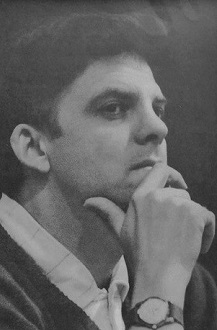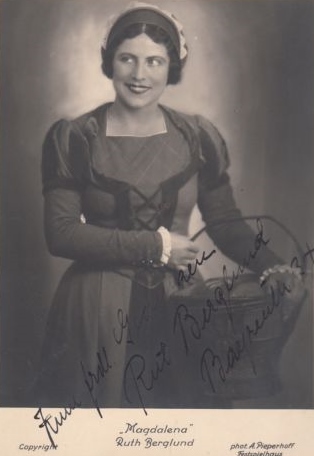Gustav Neidlinger was a German bass-baritone, known as a performer of Wagner's villains, especially Alberich and Klingsor, from the early 1950s to the early 1970s. Born in Mainz, Neidlinger studied at the Frankfurt conservatory, where he was trained by Otto Rottsieper. He debuted in 1931 at the Stadttheater in Mainz, where he sang until 1934. In 1934 and 1935, he performed at the Stadttheater in Plauen, Sachsen. From 1935 to 1950, he was a member of the Hamburg opera, where In 1937 he took part in the world premiere of the opera Schwarzer Peter by Norbert Schultze. In 1950, he joined the Stuttgart Staatsoper, where he became very popular and was, in 1977, named an honorary member. In Stuttgart, he sang in Igor Stravinsky's The Rake's Progress. In 1956 he moved to the Vienna Staatsoper, where he had sung as early as 1941. He also sang at the Paris Opéra (1953–67) and at Covent Garden in London in tandem with the Stuttgart ensemble. He was honored with the title German Kammersänger in 1952.
Gösta Winbergh was a Swedish tenor.
Lutz-Michael Harder was a German lyric tenor known mostly for his interpretation of Mozart opera roles and as a baroque concert soloist. He was also an academic voice teacher at the Musikhochschule Hannover.
Kurt Equiluz was an Austrian classical tenor in opera and concert. He was a member of the Vienna State Opera as a tenor buffo from 1957 until 1983, remembered for roles such as Pedrillo in Mozart's Die Entführung aus dem Serail. He appeared regularly at the Salzburg Festival, including world premieres such as Rolf Liebermann's Penelope in 1954. He recorded works by Johann Sebastian Bach with conductors such as Michel Corboz, Helmuth Rilling and Charles de Wolff, and prominently as the Evangelist in the first recording of Bach's St John Passion on period instruments with the Concentus Musicus Wien in 1965, conducted by Nikolaus Harnoncourt.
Hildegard Rütgers is a German classical contralto singer in opera and concert.
Hans Peter Blochwitz is a German lyric tenor, who is known internationally in opera and concert, especially for singing parts in Mozart operas.
Rüdiger Wohlers is a German tenor.
Ruth Hesse is a German dramatic mezzo-soprano. She was a member of the Deutsche Oper Berlin from 1962 to 1995, and appeared internationally, including the Bayreuth Festival and the Salzburg Festival. She appeared regularly at the Vienna State Opera from 1965 to 1988, and was appointed an Austrian Kammersängerin in 1982. In Berlin, she took part in the world premiere of Henze's Der junge Lord.
Ernst Wiemann was a German operatic bass.

Kieth Engen was an American operatic bass who was a member of Munich's Bavarian State Opera for decades. Although his career was based in Munich, he appeared internationally as a guest singer at major opera houses and festivals and performed and recorded many of Bach's Passion oratorios and cantatas, primarily with the conductor Karl Richter. He was born Keith Sheldon Engen in Frazee, Minnesota, and died in Murnau am Staffelsee, Germany at the age of 79. He was given the title of Kammersänger in 1962 and was a recipient of the Bavarian Order of Merit. In the mid-1950s he also had a brief parallel career as a pop singer under the pseudonym Stan Oliver.
Lilian Benningsen was an Austrian operatic mezzo-soprano and contralto. She made an international career based at the Bavarian State Opera for decades, where she first appeared as Eboli in Verdi's Don Carlos. She created several roles, such as Carolina in Henze's Elegie für junge Liebende at the 1961 Schwetzingen Festival. Her recordings include both operas and concerts.
Hermann Gallos was an Austrian operatic tenor and academic teacher. He was a long-standing ensemble member of the Vienna State Opera and performed regularly at the Salzburg Festival from 1922 to 1950, in roles such as Pedrillo in Mozart's Die Entführung aus dem Serail and Valzacchi in Der Rosenkavalier by Richard Strauss.
Josef Protschka is a German operatic tenor who also sang lieder and oratorio and made many recordings. A long-term member of the Cologne Opera, he appeared at international opera houses and festivals, with a focus on Mozart's roles such as Tamino. As an academic voice teacher, he was rector of the Hochschule für Musik und Tanz Köln from 2002 to 2009.

Rut Berglund, also Ruth Berglund was a Swedish operatic mezzo-soprano and contralto, who was engaged in Germany from 1924 to 1944. She was personally appointed Kammersängerin by Adolf Hitler.
Clemens Bieber is a German operatic tenor.
Peter Lagger was a Swiss bass in opera and concert. He was a member of European opera houses, finally the Deutsche Oper Berlin, and appeared as a guest internationally. He took part in world premieres such as Louise Talma's Die Alkestiade at the Oper Frankfurt, and Henze's Die Bassariden and Penderecki's Magnificat, both at the Salzburg Festival.
Carl Bissuti was an Austrian operatic bass
Johannes Chum is an Austrian operatic tenor who has made an international career, first in concert, then in opera. Initially known for historically informed performance of Baroque oratorios and Mozart operatic roles, he has developed a large repertoire which also includes Wagner's Lohengrin and contemporary opera.
Rainer Trost is a German tenor whose performance repertoire encompasses operas, operettas, Lieder and oratorios. He is known for roles in Mozart operas. He is also a voice teacher at the University of Music and Performing Arts Vienna.
Johann-Werner Prein is an Austrian operatic bass-baritone who made an international career, performing at major houses and festivals based in Germany. He performed leading roles of both the baritone repertoire such as Wagner's Sachs in Die Meistersinger von Nürnberg and bass roles such as Mozart's Sarastro in Die Zauberflöte. In recordings, he has focused on operas of the early 20th century, such as Busoni's Turandot and Schulhoff's Flammen in its 1994 premiere.


